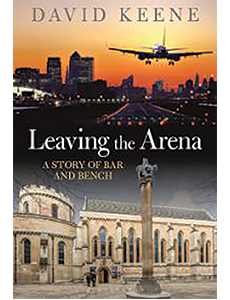*/
By David Keene

Judicial memoirs range from the deliciously (but perhaps recklessly) indiscreet (Lord Hope) to the hilarious (Lord Brown) to the earnest (Lord Dyson). Lord Justice Keene’s is in the latter category. He says it was written expressly for his grandchildren.
One interesting feature of the book is his description of his move from Chairmanship of the Oxford University Conservative Association to becoming a Labour Party candidate. I suppose this helps impartiality. There is a consideration of many important cases in which he was involved at the Bar or on the Bench, including many airport inquiries. Sir David held a range of positions including Chair of the Judicial Studies Board and the QC Selection Panel. One achievement was the introduction of a gym in the basement of the Royal Courts of Justice.
A chapter is devoted to ‘France and the Blairs’, recording the fact that Tony and Cherie stayed at their magnificent house in the Pyrenees at Saint-Martin-d’Oydes each summer. Sir David records the ‘painful’ fact that some parts of the media made up a story that his ascent to the Court of Appeal was as a result of his friendship with the Blairs, but this was assuaged by a note from Lord Bingham saying that the appointment was ‘the result of a unanimous recommendation by the senior judiciary’. It was, however, felt right by the Keenes that the Blairs should not visit again which they apparently took well.
Sir David retired early but carried on sitting in the Court of Appeal. He tells us that those judges who sit after retirement are known as ‘retreads’ or ‘returned empties’.

Judicial memoirs range from the deliciously (but perhaps recklessly) indiscreet (Lord Hope) to the hilarious (Lord Brown) to the earnest (Lord Dyson). Lord Justice Keene’s is in the latter category. He says it was written expressly for his grandchildren.
One interesting feature of the book is his description of his move from Chairmanship of the Oxford University Conservative Association to becoming a Labour Party candidate. I suppose this helps impartiality. There is a consideration of many important cases in which he was involved at the Bar or on the Bench, including many airport inquiries. Sir David held a range of positions including Chair of the Judicial Studies Board and the QC Selection Panel. One achievement was the introduction of a gym in the basement of the Royal Courts of Justice.
A chapter is devoted to ‘France and the Blairs’, recording the fact that Tony and Cherie stayed at their magnificent house in the Pyrenees at Saint-Martin-d’Oydes each summer. Sir David records the ‘painful’ fact that some parts of the media made up a story that his ascent to the Court of Appeal was as a result of his friendship with the Blairs, but this was assuaged by a note from Lord Bingham saying that the appointment was ‘the result of a unanimous recommendation by the senior judiciary’. It was, however, felt right by the Keenes that the Blairs should not visit again which they apparently took well.
Sir David retired early but carried on sitting in the Court of Appeal. He tells us that those judges who sit after retirement are known as ‘retreads’ or ‘returned empties’.
By David Keene


The Bar Council is ready to support a turn to the efficiencies that will make a difference
By Louise Crush of Westgate Wealth Management
Marie Law, Director of Toxicology at AlphaBiolabs, examines the latest ONS data on drug misuse and its implications for toxicology testing in family law cases
An interview with Rob Wagg, CEO of New Park Court Chambers
What meaningful steps can you take in 2026 to advance your legal career? asks Thomas Cowan of St Pauls Chambers
Marie Law, Director of Toxicology at AlphaBiolabs, explains why drugs may appear in test results, despite the donor denying use of them
Ever wondered what a pupillage is like at the CPS? This Q and A provides an insight into the training, experience and next steps
The appointments of 96 new King’s Counsel (also known as silk) are announced today
Ready for the new way to do tax returns? David Southern KC continues his series explaining the impact on barristers. In part 2, a worked example shows the specific practicalities of adapting to the new system
Resolution of the criminal justice crisis does not lie in reheating old ideas that have been roundly rejected before, say Ed Vickers KC, Faras Baloch and Katie Bacon
With pupillage application season under way, Laura Wright reflects on her route to ‘tech barrister’ and offers advice for those aiming at a career at the Bar